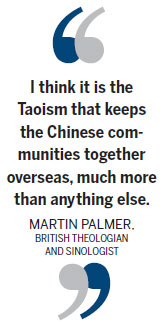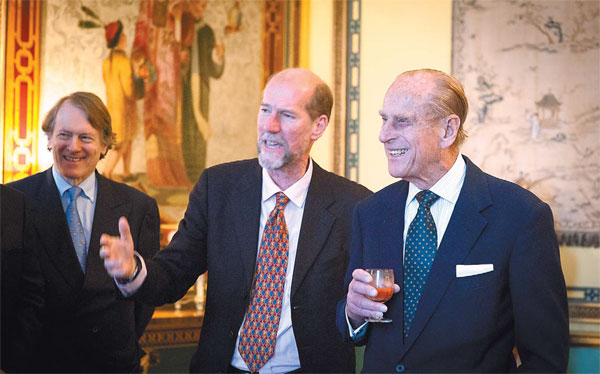In the footsteps of the master
Updated: 2015-03-06 07:50
By Chen Yingqun(China Daily Europe)
|
|||||||||||
Sinologist draws on inspiration from his compatriot to bring Taoism to the world
"After two hours with him I used to go out to walk very slowly alongside the river to let my brain cool down, because it was like being in a most extraordinary storm of ideas."
Martin Palmer, the British theologian and sinologist, and one of the foremost translators of ancient Chinese texts, is talking of another great sinologist, his compatriot Joseph Needham, also known as Li Yuese, who had a great influence on him in his twenties and thirties.
|
British sinologist Martin Palmer (center) says foreign translations of books about Chinese religion and tradition help the generations of overseas Chinese that have either lost their connection or who have rejected themselves as teenagers. On Palmer's right is the Duke of Edinburgh. Photos provided to China Daily |
"He would be quoting in Greek from Aristotle, he would be quoting in Chinese from Lao Zi or Zhuang Zi, he would be quoting in Arabic from one of the greatest Arabic minds, all in one sentence," Palmer says,
Needham, who in addition to being a sinologist was well-known for his scientific research and writing on the history of Chinese science, taught Palmer when he studied theology at Cambridge University from 1973 to 1976, the emphasis being on Chinese studies.
In the years since, Palmer has himself become well-known not only because of his writings but because of his appearances on BBC radio and TV programs about religion and ethics.
Palmer says his own translated version on the main text of Taoism, Tao Te Ching (Dao De Jing), has sold half a million copies in the past four years, mostly to Chinese living overseas.
His translations of I Ching (I Jing), Chuang Tzu (Zhuang Zi) and Kuan Yin, were published recently, as was his translation of Shangshu for Penguin Classics. The next two works to come out will be two Chinese classical novels, Three Kingdoms and Water Margin.
Palmer, in Beijing recently to promote his works Shangshu, says: "We sell most of our translations to Chinese in the UK, the United States, Singapore and Malaysia who are brought up in a culture that is not so deeply Chinese, and who can no longer read classical Chinese or interpret the meaning of certain characters that have something to do with theology."
Many Chinese living overseas are passionate about looking at the cultural roots from which they may feel disconnected, and one way of doing that is reading Palmer's translations.
There are many fifth- or sixth-generation Chinese in London whose lives have few Chinese characteristics, he says, but who are distinguishable visually as Chinese. When some get a little older they realize the importance of finding out about their roots and traditional Chinese culture, he says.

"Our role as foreigners translating or writing about Chinese religion and tradition is to make it seem legitimate to the generations that have either lost their connection or who have rejected themselves as teenagers. It is really intriguing; we sell a lot into that market."
Palmer, 61, who also speaks Cantonese, first became interested in classic Chinese when he was 18 and taking a gap year working in a children's home in Hong Kong. Before that, he knew almost nothing about China, but soon became fascinated with it and began learning Cantonese and classical Chinese.
After completing studies at Cambridge University he moved to Manchester, where there are many Chinese, and became fascinated with aspects of religion and popular beliefs such as feng shui, he says. It dawned on him that many people were reading Tao Te Ching, and that a great deal of Chinese life in Britain was shaped more by Taoist beliefs than by Confucian philosophy.
During many important festivals, people would tell stories about different gods, he says. There would be a kitchen god, an earth god and a god of money.
"I think it is the Taoism that keeps the Chinese communities together overseas, much more than anything else."
When he first visited a Taoist temple, he says, he was astonished to find that there were more than 400 gods and he had no idea who they were or what their roles were. "I was fascinated and also challenged."
He also came across Christians who would pray to Buddha, and it seemed to him that being able to choose one God while at the same time praying to others was "delightfully liberating".
Palmer was brought close to Christianity, his father being an Anglican minister, but he says that he had many questions about Jesus Christ, and ultimately his path to that faith was an indirect one.
"My Christianity is deeply shaped by my Taoism. I was only able to become a Christian because understanding Taoism helped me throw away some of the baggage of Christianity. I think there are insights in Taoism that we need to help Christianity reintegrate itself and get rid of some of the baggage in the way that Taoism has had its baggage stripped. I want to foster that, and one of the next things here I am planning is a joint program on the values that underpin Chinese culture and the values that underpin Western culture."
Palmer was invited to translate Tao Te Ching in 1983 and had a Chinese feng shui master and a British poet working with him.
The first version of the translation is riddled with Chinglish, he says, because many cultural things are confusing for Westerners.
"There's always a question of how much information you put into a translation, how many footnotes you do, how much you just say, 'Let's get something done and see how much it works'."
But as a theologian, he had no fear of deconstructing a text, whereas most translators with no theological training tend to stick rigidly and literally to the source language, he says. Moreover, a poet friend of his helps him find rhymes and other poetic devices in the originals, which will add to the aesthetic beauty of the translation.
Translation can be a mysterious process, he says. Some mornings he will go to the study and open a text, sit there and look at the first paragraph, and have little idea of what it is about.
"I cannot even recognize half the characters, so I get the dictionary out and look at the dictionary, and nothing works, and I might clumsily translate six or seven lines if I'm lucky. Other days I will come in, sit down and the text will talk to me. I'm not translating it; it is talking to me."
Palmer says there are few Taoists in the West, and he reckons that in Britain there are no more than 30, even if there is a huge interest in Taoism.
"It is a personal journey, not having a master, not belonging to a temple. Tao Te Ching is the most translated book in the world other than the Bible. Taoism deeply influences the thinking of people. It influences artists, poets, novelists, etc. Not that they are saying, 'I'm a Taoist', but there is a huge amount of information about Taoism at an individual level."
Palmer is the secretary-general of the Alliance of Religions and Conservation, a secular nongovernmental organization founded by Prince Philip, in 1995 to help faiths develop conservation projects based on their own teachings, beliefs and practices.
The alliance has projects in 80 countries and works with 12 major religions worldwide as well as with secular organizations such as WWF, the United Nations and the World Bank.
"We work with 16 or 17 different traditions of Buddhism, 18 different traditions within Christianity, 10 or 11 different traditions within Islam."
The work ranges from improving the environmental management of buildings owned by religious organizations, sacred sites, commercial forestry and farmland, through to greening of pilgrimages and faith-consistent purchasing and investment. It also involves capitalizing on the faiths' huge outreach and influence through teaching activities and spreading wisdom and a sense of celebration.
Indeed, it is celebration that Palmer thinks adds a unique contribution to what otherwise can often be the doom and gloom of conventional environmentalism.
chenyingqun@chinadaily.com.cn
(China Daily European Weekly 03/06/2015 page29)
Today's Top News
Bright Food continues with overseas expansion
China lowers annual GDP growth target to 7%
China faces 'formidable challenges'
Diplomats talk about 'two sessions'
US ambassador to S.Korea attacked
Belgian royal couple to visit China
China faces 'formidable challenges', says Li
China's defense budget to rise about 10%
Hot Topics
Lunar probe , China growth forecasts, Emission rules get tougher, China seen through 'colored lens', International board,
Editor's Picks

|

|

|

|

|

|






